The question of whether to create a website is one that many people are asking themselves as we move into 2025. This is a question that can be posed by a wide variety of individuals and groups, including small business owners, freelancers, and those engaged in the development of a personal or professional project. Regardless of the specific circumstances, understanding the financial implications of launching a website is of paramount importance.
It is a common misconception that web development is merely the process of designing and creating an aesthetically pleasing website. In reality, it encompasses a multitude of additional considerations, including hosting fees, domain registration, and ongoing maintenance costs. The sheer number of options available can be overwhelming, particularly given the necessity of this investment for any business with an online presence.
In this article, we’ll provide a comprehensive overview of the various costs associated with building a website in 2025, offering insights and guidance on how to make the most of this essential investment. By the end, you will have a clear understanding of the financial implications and the key considerations for budgeting effectively for your online presence.
How to build a website?
There are two main approaches to website development. You can use ready-made tools, or create a custom website from scratch.
Regardless of the option you choose, when you decide to create a website, the question is: should you do it yourself, hire freelancers to build it, or finally – collaborate with an agency? All these approaches have pros and cons. The best choice for you depends on the time and budget you have.
Let’s compare these three options to build a website more closely.
Option 1: Do it yourself
Nowadays, using Google, you can find all the information you need about website development and build it yourself. Furthermore, the cost of building a small business website can be either free or many times lower. But where is the catch?
Undoubtedly, the lack of development experience is one of the main problems for a founder. Creating a website yourself without using a website builder can take months. Still, there are many other aspects you need to be aware of.
To start everything from scratch, you need to learn the basics of HTML, understand the administrative panel, install and configure the template, add all necessary premium plugins, and understand many other nuances. All this can be cumbersome if you are a novice in creating a website from scratch.
Pros:
- Development costs will be lower or even free;
- You can choose any ready-made web design you want;
- You might want to use a convenient website builder.
Cons:
- You’ll spend plenty of time learning;
- Huge chances of making many mistakes;
- You can waste more money later on to correct defects.
If you have a tight budget and want to create a website using a ready template quickly, you can try it yourself, of course. There are various top trendy tools to do so in 2025, such as Wix, Squarespace, HubSpot, Duda, Shopify, Weebly or Webflow. Besides, it is suitable as a temporary decision to test the idea quickly.
But, when you need a more complex solution with custom design and business logic, hiring a professional would be a great idea. This way, you will be able to save both design costs and costs to build.
Option 2: Hiring a freelance web developer and designer
There are a lot of sites where you can find freelancers for your project: Upwork, LinkedIn, Behance, Fiverr, and many others.
Indeed, hiring freelancers will be cheaper than hiring an agency and a better solution than using a website builder. However, you should be careful when choosing the person to build a website. You must thoroughly check the person’s references, previous works, and overall expertise.
Pros:
- The website cost will be lower than hiring an agency;
- You can get a more personal approach.
Cons:
- You are limited to the resources and skills of the freelancer;
- Sometimes freelancers are not reliable;
- The average cost of work and rates per hour may differ and thus, complicate the budget planning.
Besides, the country where you decide to hire a web developer or web designer also affects the final price for creating a website. Average hourly rates for web developers and designers range from $30–$50 in Eastern Europe to $100–$150 in Western Europe and $150–$250 in North America.
Option 3: Hiring an agency
Hiring a website development agency to create your site is a traditional approach with many advantages.
Pros:
- You’ll receive a custom-designed solution;
- A professional website will be created on time;
- You can expect a high-quality website;
- Your website will be well-optimized.
Cons:
- The website cost will be higher;
- The right company can be challenging to find;
- Further product maintenance costs can appear.
What option should you choose?
So, which approach is better: doing it all by yourself, hiring a freelancer, or working with a website development agency?
The choice highly depends on the demand and idea you envision. If you’re aiming to get a unique, custom, and fast-performing website, hiring an experienced agency would be the most accurate suggestion. Of course, in this case, the average cost of website development increases significantly. But you will get major benefits:
- A well-coordinated team including software engineers, designers, QAs, DevOps, SEO specialists, analysts, project managers, and other experts;
- A streamlined development process;
- High-quality solutions;
- Transparent development cost negotiations;
- Well-established communication, which ensures higher efficiency.
Furthermore, the employees in an experienced agency have already created multiple websites like yours. Thanks to this, you will benefit from their combined knowledge, expertise, and the set of skills needed to build a high-quality business website.
To put it in a nutshell, hiring a professional team is an opportunity to make a high-performing website while avoiding risks associated with building a new web solution. Such risks can include missed deadlines, wasted website development costs, and other problems.
At Codica, we are doing our best to match clients’ expectations and envision their ideas in practice. For Instance, these words are greatly reinforced with CakerHQ – a custom SaaS platform for bakery business.
All our proficiency resulted in a great website design and a well-thought-out user experience. Besides, we worked on a reliable and secure payment system along with other convenient features for users to benefit from.
As a result, Lisa, CakerHQ’s founder, received a final product within the discussed timeframe. Now, as a founder, Lisa has managed to hold a solid place in the baking business niche in Australia, and we cannot deny our happiness in helping her build her way to it.
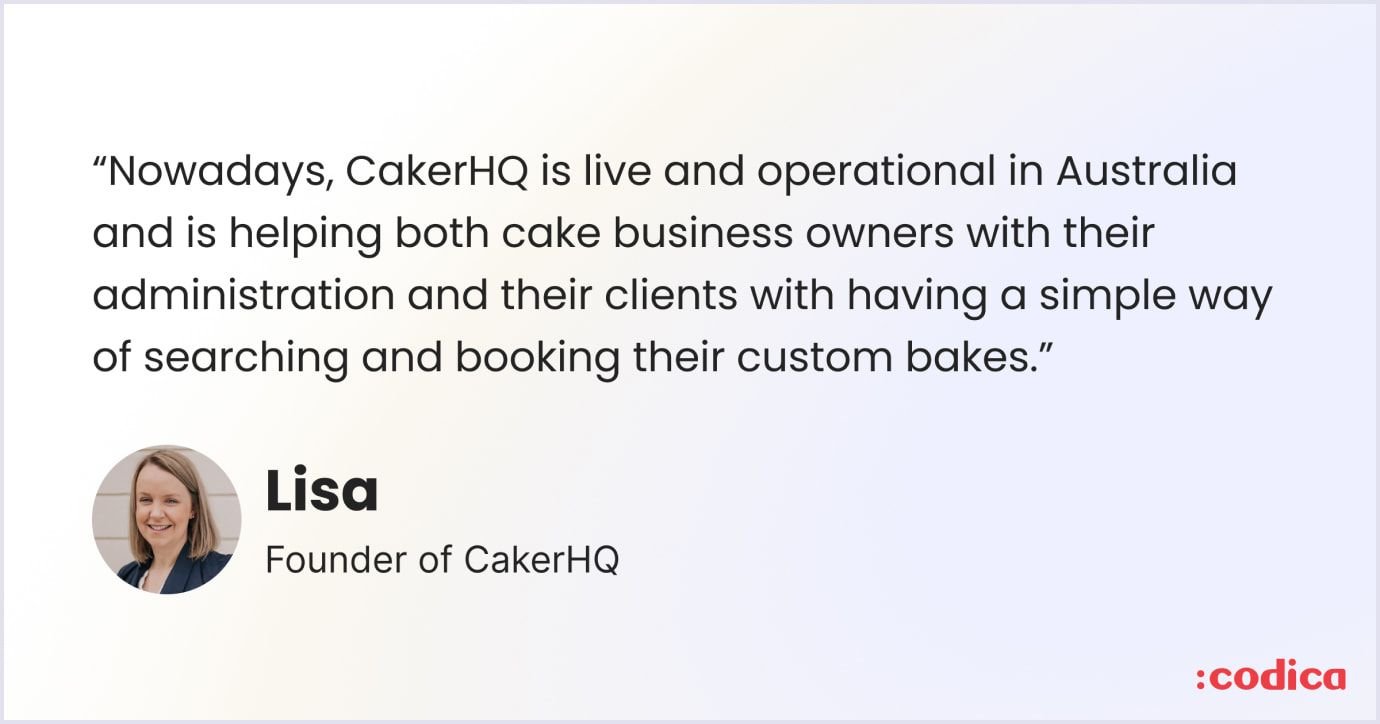
Bonus: estimate for different website types
By the way, we prepared for you a list of our articles that also answer the question: “how much does it cost to build a website?”. We will tell you how to build different types of websites like Amazon, Airbnb, or a video streaming platform like Netflix in detail.
- How Much Does It Cost to Create a Website Like Amazon
- How to Create a Micro-Job Marketplace Like Fiverr: Features, Cost, Timeline
- How Much Does It Cost to Build a Website Like Airbnb
- How Much Does It Cost to Make a Video Streaming Website Like Netflix
- NFT Marketplace Development: What Is It and How Much Does It Cost
- How much Does It Cost to Create a Bidding Website Like eBay
- How Much Does It Cost to Build a Website Like Upwork
- How Much Does It Cost to Build a Website Like Indeed
- How Much Does It Cost to Create a Classifieds Website Like Craigslist
- How Much Does It Cost to Create a Website Like Udemy or Coursera
- From A to Z: How Much Does It Cost to Build a Website Like Alibaba
- How Much Does It Cost to Build an Online Marketplace Like Etsy
- How Much Does It Cost to Build a Job Board Website Like Glassdoor
What team will you need for website development?
The development of a high-quality professional website requires skilled specialists. If you choose to cover the whole website development on your own, you will need to combine engineering, design, and testing skills together.
On the contrary, if you think hiring an agency is the right way to go, make sure you find a team that has the most relevant experience and the most appropriate specialists on board. Generally, the number of team members to build a website varies depending on the type of site and its complexity.
So, who are all these people that a web development team typically includes?
Project managers (PM)
Project manager organizes the website development process, finds out the customer’s needs, and discovers solutions for them. In general, a PM is a person who is responsible for all the processes of maintaining and successfully completing a project.
A PM sets tasks, monitors their implementation, and holds regular meetings with the team. Project managers are present on the project starting from the very first idea validation. They participate in planning sessions, composing time and fund estimates, and market analysis.
UI/UX designers
Usually, the development team has designers who perform both UI and UX roles. The aim of the UI/UX designer is to develop a user-friendly interface that enhances users' experience in working with the product. Besides the creative part, they conduct very detailed research on the product idea. Moreover, all the logic you see in every app or website also exists, thanks to design team brainstorming sessions.
Frontend and backend developers
Frontend developers are responsible for the functionality of the web interface. They not only translate a design into code but also take care of many other aspects. For instance, front-end developers’ work covers the whole lifecycle of the product - website performance, search engine optimization, cookies, etc.
To compare, backend developers are responsible for the internal processes of sites. For example, they build data exchange, select systems for storing and managing information, and set up payment gateways.
QA engineers
A QA engineer is a quality assurance specialist. The main task of the QA specialist is to find errors in the operation of the web product. QAs try to look at the product from the viewpoint of the end user. Therefore, sometimes they "intervene" in the development process and suggest adding more convenient functions to the program even before the QA stage has started.
DevOps
DevOps specialist is one who combines different methodologies, practices, and even philosophies to balance the powers during development. DevOps are strongly involved in the product development lifecycle to increase the team’s velocity and efficiency. Normally, these specialists combine knowledge of coding, maintenance, and management to deliver the best results in a fast-paced working environment.

For the subsequent promotion of the site, the team should include SEO specialists and content managers and copywriters.
SEO specialists
A search engine optimization (SEO) specialist is a person who promotes websites in search systems. Thanks to website optimization service, your site will gain more visibility in the search results. Therefore, more potential customers will visit the site.
Content managers and copywriters
These two take care of the process of filling out the company's website. Using a variety of tools and technologies, their main task is to ensure that the page, social networks, and newsletters are regularly updated with fresh information that attracts users. In this matter, a copywriter is a specialist who creates texts according to the content management system. These can be thematic articles for a site, posts on social networks, email newsletters, or press releases.
Also, in different situations, you may need additional specialists to build a website. For example, creating a premium theme can involve photographers, animators, consultants, artists, and others.

What does the cost of a website consist of?
The more complex the functionality of your website is, the more hours of development will be required to implement your idea. For now, let's see the main factors that impact the cost of a website. The website development cost consists of several components such as:
- Type of website (company website, landing page, online store, etc.);
- Development price;
- Web hosting cost;
- Domain registration fee.
Pricing is affected not only by the creation of the site but may also include additional services such as:
- Support and maintenance;
- Content filling;
- Promotion, etc.
To answer the question of what the cost of a website consists of, you also need to figure out how the price is formed and what the stages of development are.
Types of websites
Speaking from our experience, the type of website usually stands as the main pricing factor. For example, a business card website cost will be lower as it is fairly simple to design and build. Online store, in turn, has different mission, set of structures, and functions. Website cost often varies based on hours spent to develop and the technology stack involved.
Simply put, a business card site usually consists of several pages. It provides the necessary information to the visitor and enables them to contact the company representatives.
To compare, an ecommerce custom website can consist of hundreds or thousands of pages. It can help visitors to:
- Search for products and compare prices;
- Make and pay for purchases;
- Compose wish lists and share them;
- Keep track of new products or goods of a certain category;
- Track purchases and delivery in their account;
- Get and spend bonuses, take part in free promotions.
Therefore, the cost of websites depends on their purpose, web design complexity, and functionality. There are many types of websites, but we will share with you the most popular ones.
Landing pages
A landing page is a web page that compiles the contact information of the target audience, has a simple informative purpose, or is sales-oriented.
It is used to increase advertising efficiency and also expand the customer audience. Besides being simple enough, the landing page development cost is comparatively low. On the contrary, more investment should be put in the UI part, as good design costs more.
Examples of landing pages:
Business card websites
A business card website is a small site composed of one or several pages. It contains basic information about an individual, organization, or company.
Examples of business card websites:
It is important to mention that a business card website is not the same as a landing page. Certainly, there are similarities because both types of web resources have one page and brief information about the company.
However, the landing page is created for an offer. It can present the product, grow the customer base or have an informative purpose. Usually, it is a standalone page On the contrary, the business card rarely contains information about discounts or promotions. Normally, it has around 5 pages with a feedback form, contacts, the home page, and services sections.
Here’s an example of a business card website that solely relies on a catchy design and style with only important information at the bottom.

Source: Copper & Brave
Corporate websites
A corporate website is a high-grade and full presentation of a company on the Internet. It presents a detailed description of the company's activity, its goods, or services.
The main goal of this type of website is to engage new customers, partners, and also enhance current partnerships. Moreover, building a website to present the corporation helps to develop business by demonstrating the advantages of the company.
Examples of corporate websites:

Source: Apple.com
Web portals
Usually, web portals are developed for the internal purposes of organizations or institutions. For instance, a university may want to have an e-learning web portal to allow students access to information about their exams, grades, or courses taken.
Examples of web portals:
Blogging websites
The main task of blogging on a custom website is to share information on a specific theme. In brief, it is a web page with articles, also called blog posts. These platforms let users not only to blog, but to exchange information, comment on other works, and communicate.
Examples of blogging websites:
Community forum websites
A community forum website is a site for communication between Internet users on one or more topics. Initially, users need to register to start or join existing discussions. These websites aim to unite users, engaging them to drive discussions, write posts or leave comments.
Forums heavily rely on comfort and performance, as people tend to spend a lot of time there. Nowadays, they vary a lot. Some keep up with trends and have a lot of features, like Discord. On the contrary, some are more old-fashioned, like Reddit.
Examples of community forum websites:
Magazine and news media websites
Magazine and news websites are quite similar to blogging websites. However, they are more focused on sharing informative and educational materials. Meanwhile, blogging websites share personal opinions and ideas.
Examples of news media websites:
For example, recently, the Codica team helped an African online news portal DUMA to develop and scale their existing solution. Our task was to make a high-quality site redesign, migrate to AWS without downtime, and optimize the web application for mobile users.

As a result, this news portal now covers 11 locations in Africa and has 2 ecosystems with 17 live websites and more under development. Thanks to the thought-out plan, we also optimized the loading speed.
Now, even with a bad connection, mobile users rarely experience poor performance loading images, articles, and other content. The ecosystem continuously evolves, and the number of websites grows as we continue the maintenance.
Video streaming websites
The popularity of video streaming websites, such as Netflix and YouTube, has grown over the last decade. Building a website like this requires clear niche definitions and constant website maintenance. So, if you want to create this type of website, developing a unique solution will help you stand out in the market.
Examples of video streaming websites:

Ecommerce websites
Obviously, you know such e-commerce website giants such as Amazon, AliExpress, and eBay, which are great examples of e-commerce websites. To put it shortly, e-commerce websites, or marketplaces, are built to sell goods or services.
More examples of e-commerce marketplaces:
Here is one of our greatest examples – a multi-vendor e-commerce website. Our goal was to build a feature-rich and competitive marketplace site from scratch. Another thing we are proud of is the successful implementation of B2C and C2C business models within a single product. The ability to operate on different markets allows end users to create an impressive number of pages for their goods.
Combining a custom premium theme, a convenient tech stack, and modern integrations, we managed to build a product with rich functionality and a very intuitive user flow.
For instance, we successfully implemented advanced search filters, a convenient payment system, and a full-featured admin panel in the project. Despite using a broad set of technologies, we delivered the product in short timeframes and with optimal website cost. Now, let’s take a look at how it works.
Thus, we built a powerful e-commerce solution to fulfill the client's needs and requirements. The business’ CEO received a convenient and styled version of the website, thanks to our development team consisting of:
- Project manager;
- 3 frontend and backend developers;
- UI/UX designer;
- 2 QA engineers.
Further reading: C2C Marketplace Development: Why Invest in Your Own Platform
Website development process
Web development is a major part of the budget. Let’s take a look at the main stages of creating a website to help you better understand how it works.
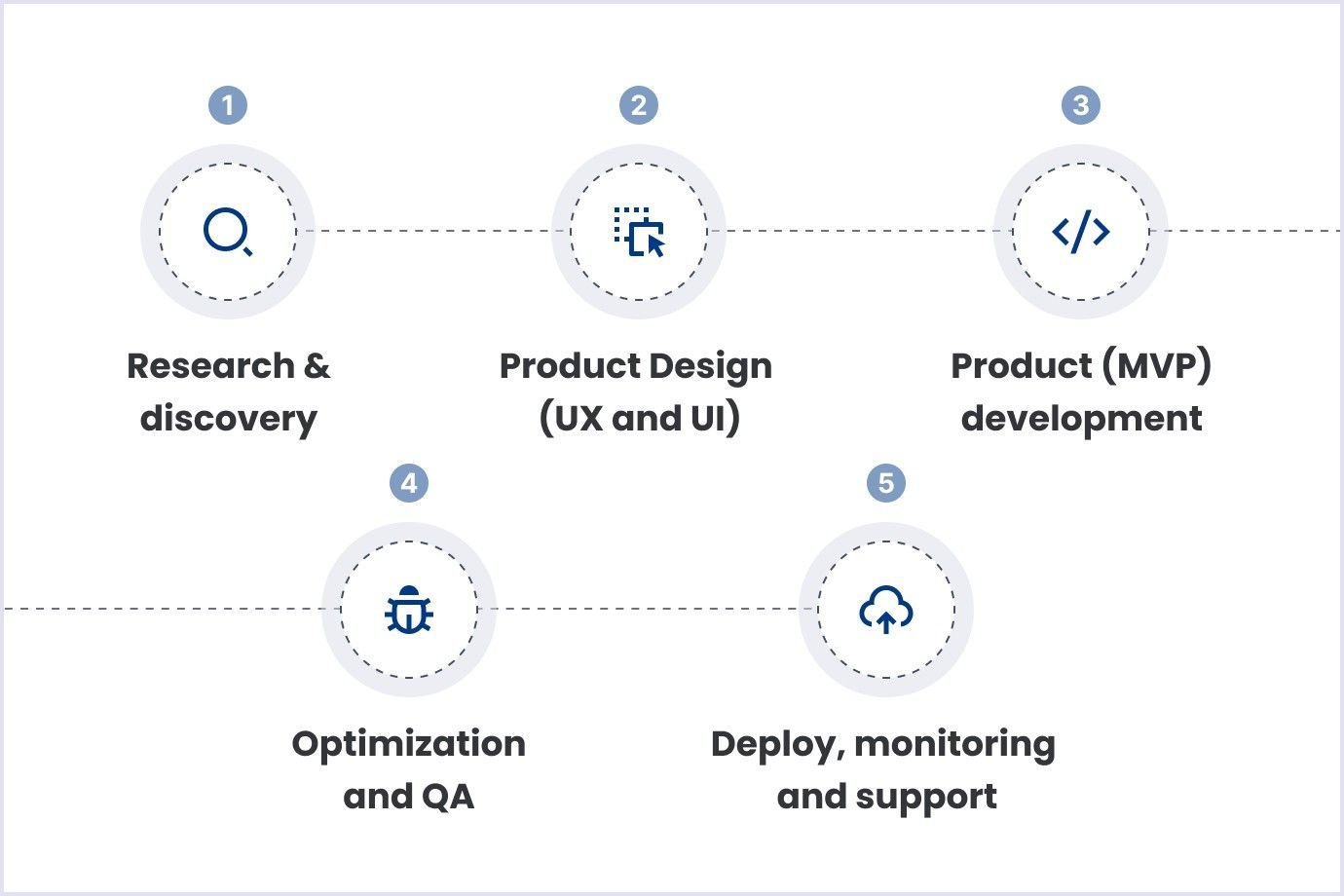
1. Research and discovery
At first, the concept of a future website is discussed with the client, goals are defined, and tasks are set. Notably, the software product discovery process is one of the most crucial stages in custom website development.
In brief, the main goal of this stage is to define the requirements and analyze the client’s needs. Consequently, the customer receives accurate project estimation and finds out the website development costs.
Read also: What Is Project Discovery Phase in Custom Software Development
It's better to start by developing the website's basic version. Creating a minimum viable product (MVP) with primary features will help cost-effectively and quickly test your idea. However, MVP development service suits sizable projects and may not be applicable to landing pages or business card websites.
Then the discussion is held within the team, and the hours allotted to the website development team are counted. What’s next?
2. UX/UI design
Based on the data received, the project manager writes the terms of reference. The designer creates prototypes that have been agreed upon during the product discovery.
After that, website layouts are drawn: the time spent depends on their number. For example, a complex online store requires at least 300 hours for a web designer to make. Notably, the estimated work time is also pre-planned during the product discovery.
3. Web development
The approved pages are handed over to website builders: frontend developers, who "enliven" the pictures. They both, with a backend developer, start working with the code. Apart from coding, these specialists set up various aspects of their work.
For instance, they plan the architecture of the future project and divide it into stages where each stage has a pre-defined time to be built. They set up the environment for CI/CD (continuous integration and continuous deployment) workflow, during which multiple changes are made to a codebase simultaneously.
4. Optimization and QA
Then, the QA engineer checks the quality of the website functionality, usability, and performance. Bugs and errors are fixed and rechecked after correction.
Finally, the frontend and the backend parts of a site are tested. Website testing is a critical stage in web development. A web system must be thoroughly tested before it is released to end users.
5. Deployment, monitoring, and support
After launching a website in 2025, you may also need web support to ensure the stable and secure operation of the site. This service is relevant when the range of your site’s products is constantly growing. Therefore, you need to update information, add articles, news, post videos, and so on.
Furthermore, web support is necessary when there are problems with the operation of the site, or you need to change some site’s functionality.
Website maintenance is complicated to do on your own because you have to work with it at several levels, from design to security. As a rule, professional web development agencies employ qualified specialists who take responsibility for the site's operation and guarantee its continuity.
UX/UI design costs
The website design price depends on how long it takes to create the website layouts.
If you wonder how much it costs, prices for web design can range from $300 to $20,000 and over, depending on what you want your website to look like and how professional it is. We recommend you create a unique website design because it is better promoted by search engines, unlike template-based websites made in a website builder.
Moreover, the designer's qualification is also important for website layout creation. Thus, it is better to cooperate with the UI/UX design services company rather than delegate part of the work to freelancers. The website design developed by third-party designers can lead to problems, even though the average cost may be lower.
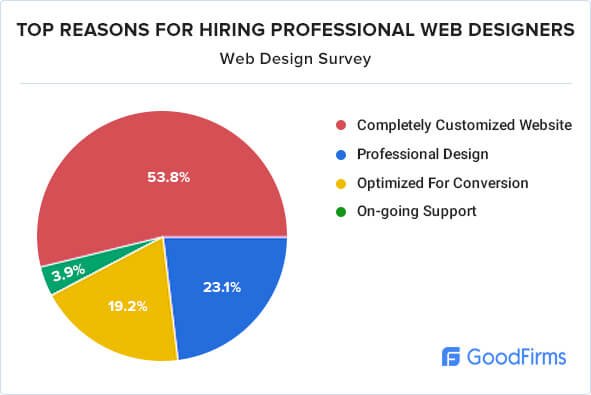
Source: GoodFirms
SEO, content creation and marketing
Many small business owners still hope that customers will find their sites on their own. Unfortunately, it doesn’t work like that. Unless you are selling something very specific, you will have dozens or even hundreds of competitors. Furthermore, many of them exist for a long time and successfully use the full range of SEO tools for websites to advance to the top of search results. In this matter, marketing is something you should expect to pay for. Thus, considering some website optimization services may come in handy.
From the very beginning of website development, it is crucial to consider the current requirements of search engines in terms of SEO for websites. Notably, a huge amount of work is carried out both before the platform launch and after it.
Certainly, the more complex the custom website is, the more time the SEO specialist needs to promote it, and the higher the website speed optimization services' price. Undoubtedly, it is far better to do the best from the beginning and hire an expert to do SEO for website, than to waste time and money fixing mistakes later.
Website marketing expenses you may encounter:
Search Engine Optimization (SEO)
Nowadays, defining an SEO strategy for a new website is crucial and cannot be omitted. It works in a way when the user enters a query in the search bar, and your site is displayed in the top results. Specialists use a wide variety of SEO tools for websites to help businesses drive organic traffic to the page. Therefore, the higher the position of your resource for specific queries, the more chances you will have a potential customer.
It is evident that SEO plays a pivotal role in digital marketing. To illustrate this, one can cite the findings of a Backlinko study, which revealed that the initial search result garners 32% of all clicks. This highlights the significance of securing a high search engine ranking, particularly in light of the fact that only 6% of users click through four or more search results pages. These figures not only underscore the importance of SEO in 2024 but also the necessity for businesses to prioritize search engine optimization in their digital marketing strategies.
In brief, SEO promotion is a long process that requires a defined set of knowledge. The price of the website optimization service depends on the niche, the volume of the company, the number of keywords, etc. On average, the price for search engine optimization services can vary from $500 up to $7000 per month.
Pay Per Click Advertising (PPC)
One of the most common methods is an advertising campaign on Google. You enter data about a product or service and show it to potential customers. You are to pay for every single user’s click on the ad. In fact, the cost per click varies in different niches, so make sure you are ready for some flexibility in the budget.
For example, one product can be advertised almost for free or for 1 cent per click, and another – for 50 cents and obviously becomes a solid sum per year. At the same time, there is no guarantee that the person who opened the site will make a purchase. In order not to waste your budget, it’s recommended to hire someone experienced to compose both a content management plan and a marketing strategy.
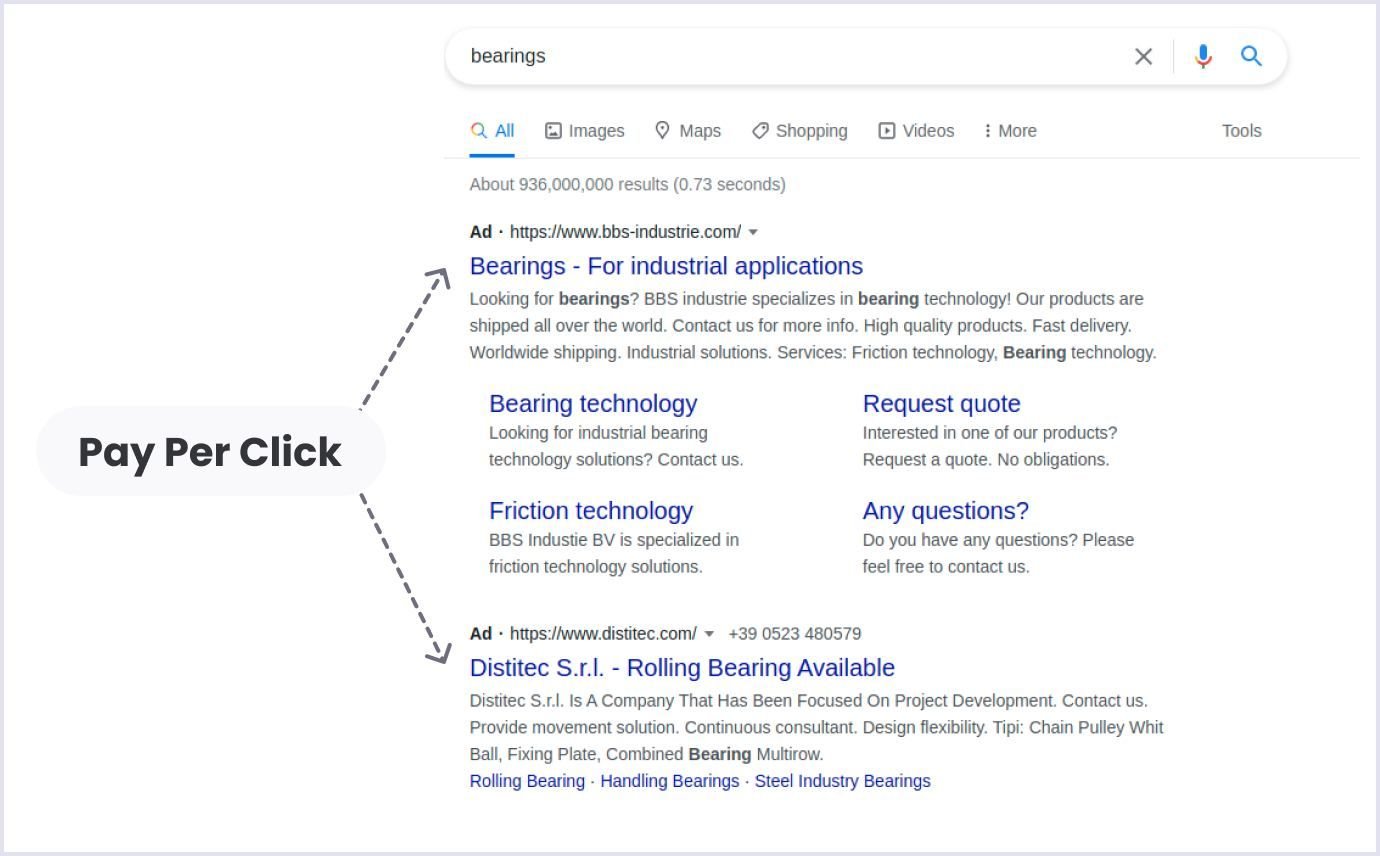
Copywriting
High-quality content on your business website not only gives the user free necessary information. Moreover, it also has a positive effect on website optimization. Pages include key queries that the search engine analyzes and determines the place of a particular page in search results.
As a rule, the copywriter writes the text with a predefined number of pages explaining or describing website features and its niche. Each page on the site serves a specific purpose. Basically, the text aims to sell or engage readers. Thanks to a qualified copywriter's work, a well-written text can sell a product or service.
On average, you can expect to pay for copywriting services from $25 to $500 and over for a set number of pages or words. The average rate fluctuates a lot as it depends on many factors, including the industry, the location, the volume you need to have written, and the expertise of the particular writer.
To sum up, investing in digital marketing is a necessity. Undoubtedly, this investment will bring more traffic, and it will become a decisive moment in your company’s revenue growth.
Domain name, hosting and SSL costs
Apart from traditional time- and cost-consuming aspects, there are more miscellaneous ones. These are still quite important as your future website relies on them as well. Let’s break down what they are and figure out their significance.
Web hosting
Creating a custom website implies not only the implementation of a web design project. To make your business website searchable on the Internet and visible to people worldwide, you need to research hosting providers and consider hosting costs, which means that you will rent some space on a server.
As a rule, this service comes in a subscription-based form and may have some additional maintenance costs. Website hosting services usually offer a broad number of options, whether it’s a small business or a well-established one.
If you wonder how much it costs, it depends on the size and purpose of your site. Typically you will have to pay from a few dollars per month to hundreds of dollars per year for web hosting.
Read also: How to Choose Web Hosting for Your New Product
Domain name
Also, you will need to choose a domain name. This name represents the address of your site on the internet and is what users need to know to find you. Preferably, you should have a simple and bright domain name containing your brand or company name. There are several options to obtain one. Usually, it’s either get a free domain or pay some extra from your website costs for popular extensions like .com or .org.
Anyway, for a small business, we would suggest not choosing a free domain. Hosting providers usually give very little control over it. You can experience some unexpected shutdowns or performance bugs.
By the way, if you decide not to choose a free domain, you will be offered to subscribe and pay on a monthly basis. Yet it’s a comparatively small investment because the total cost is usually $10–$20 per year.
The ultimate owner of all domains is ICANN (Internet Corporation for Assigned Names and Numbers). Therefore, you will need to rent a domain for a certain amount of time and then renew your subscription for as long as you plan to use it.
Besides, never consider omitting this part. The domain name is important, and your website's popularity certainly depends on it. When you are considering SEO for a business website, the domain name will be one of the first things for specialists to notice.
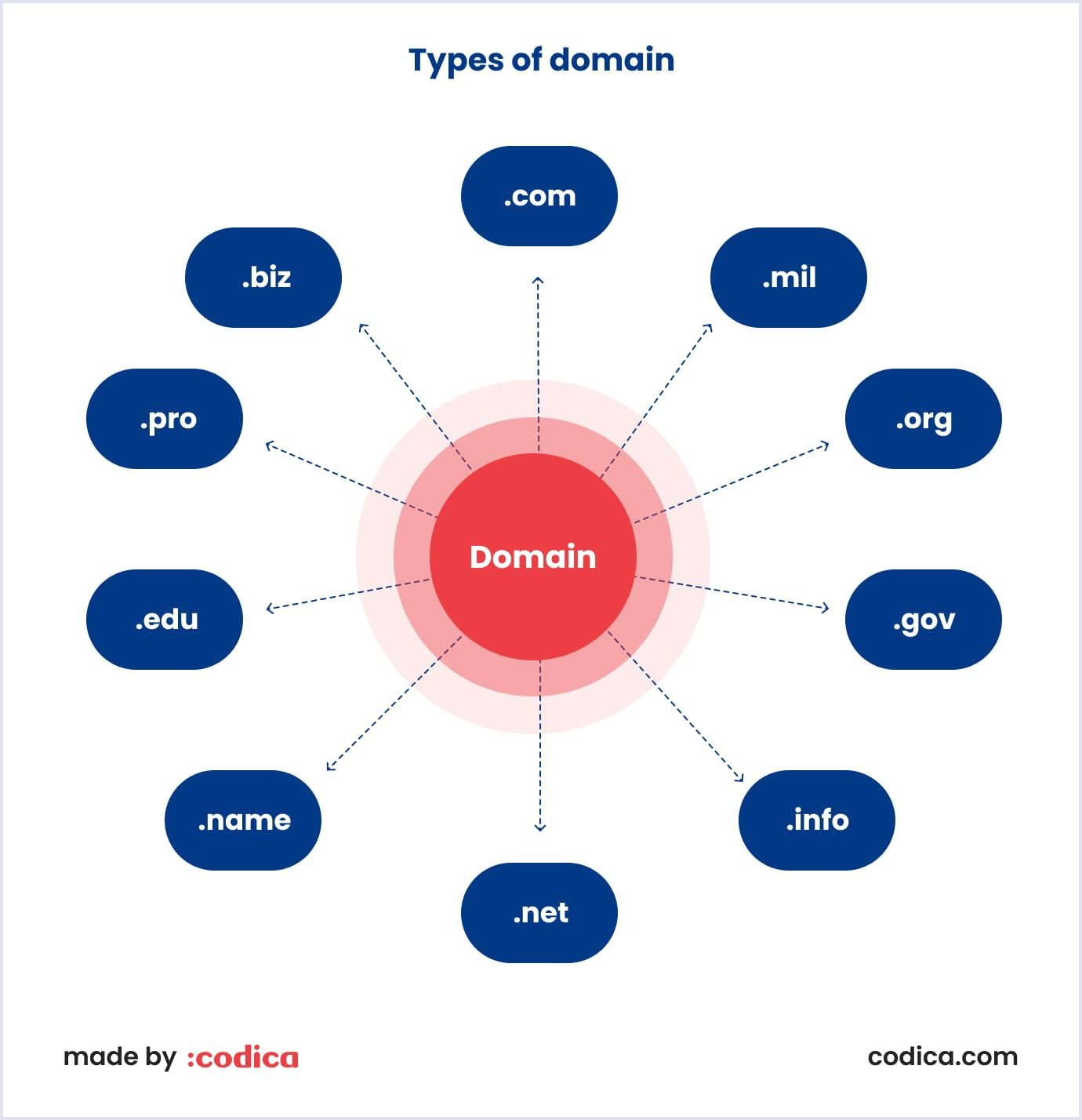
SSL certificate
In terms of safety, your site needs a Secure Sockets Layer (SSL) – a special certificate to protect the user’s personal data (i.e., logins, passwords, bank card details, etc.)
Notably, the SSL certificate is beneficial for the site owner. This way, you make sure that your site is safe and takes care of customers. In brief, the less risk for users, the higher the reputation of the company. When it comes to safety, it's the last place to think about a free SSL certificate.
Similar to free domains, they never give any warranties about data leaks or potential fraud. The cost of SSL certificates may range from $1 to $125 per month or from $10 to thousands of dollars per year. The prices vary because of security measures. For instance, more expensive certificates have more complicated encryption, and their reputation may also raise the price.
Clearly, maintaining a site on your own without a certain level of knowledge and experience is difficult. People tend to save money where it seems viable, on a free SSL certificate or a shared domain. Thus, the errors that arise as a result can affect functionality and performance in general.
So, you definitely need technical support for your custom website. Notably, many businesses invest thousands of dollars per month in tech support which saves them lots of time and money.
How much does building a website typically cost?
It is now appropriate to examine the cost of website development in greater detail. It is evident that the complexity of the website features that are to be implemented will result in a higher cost and a longer development period.
It is important to note that a well-constructed website with a superior web design can facilitate the acquisition of a greater number of unique users and a more stable income. It would be unwise to forego the opportunity to enhance the visibility of your company on the Internet and construct a website. It is likely that your competitors have already established a presence online, so it would be disadvantageous to remain on the periphery.
In the preceding sections, we have discussed all the possible aspects of custom website building. In this section, we will examine the approximate price range for building a website in 2025, its design, and the development processes that may be employed, depending on the type of website that is ultimately chosen. If you feel unsure about how much a website should cost in 2025, in this estimate, we have taken the average per-hour rate among Eastern European software development agencies, which is approximately $50.
Nowadays, most companies offer the following approximate website cost:
| How much do different website types cost to build? | ||
| Type of website | Average time to build, hours | Approximate cost, $ |
| Landing Page | 80 | 4000 |
| Business Card Website | 120 | 6000 |
| Corporate Website | 800 | 40,000 |
| Blogging Website | 800 | 40,000 |
| Community Forum Website | 800 | 40,000 |
| E-Commerce Website | 1,000 | 50,000 |
| Web Portal | 1200 | 60,000 |
| Magazine and News Media Website | 1,200 | 60,000 |
| Classifieds Website | 1,300 | 65,000 |
| Video Streaming Website | 1,500 | 75,000 |
| Educational Website | 1,500 | 75,000 |
| Job Search Website | 1,500 | 75,000 |
| Marketplace Platform | 1,500 | 75,000 |
| SaaS Solution | 1,500 | 75,000 |
Please, pay attention that only your website development partner will be able to estimate more precisely how much does a website cost. If you have a clear vision of the product, formulated requirements, and wishes, the project estimate will be more accurate and cost-effective.
Also, planning a small business website, be aware of budget companies that stand as website developer, because highly relying on them may lead to the following:
- Instability in the web hosting performance and, accordingly – bugs in the entire project;
- Critical errors in the core functionality of the website;
- Incompetent support from the developer;
- Poor website design;
- Loss of existing customers, decreases in sales traffic, and profit losses.
To sum up, it’s totally on you whether to save on the website cost. Yet a profitable resource that increases traffic and sales cannot be very cheap.
How does Codica develop a website for you?
At Codica, we understand that website development is not about the lines of code. Instead, it's an opportunity to create a digital experience that touches the hearts of your audience. We always pay attention to:
- Strict adherence to deadlines;
- Established and transparent development process;
- Excellent communication and regular updates;
- Deep expertise of the team involved in your website development.
Our team is committed to working very closely with you in developing your idea into reality. We make sure your website will be functional, appealing, and user-friendly.
Example: online service marketplace
Take, for example, our work with PlanMyKids. We designed an e-service marketplace that connects parents with local kids' activities. Below is how we were able to take an idea and build it into a successful platform.
What we did:
- Scalable MVP. We provided a minimum viable product quickly at low cost to enable the client to test their concept without investing too much.
- User-centric design. In building a progressive web app for us, it meant that busy families easily accessed and booked activities both on their computers and smartphones.
Codica’s experts are believers in the great power of collaboration: hand in hand from an idea to final launch. Let's develop a website that will satisfy your needs and at the same time be eye-catching for users, which is also vital for your business to grow.
Summary
So, we hope our detailed guide helped you answer the question: how much does it cost to build a website?
Undoubtedly, website development is a powerful marketing tool. Despite its total cost, it enables you to solve many issues: inform, sell, advertise, create a company image, and increase customer loyalty. And by choosing a professional web development agency, you will save your time and website costs in the long run.
If you entrust the development to experts, you will get a high-quality, optimized site that helps you to grow your business, so being updated about website cost in 2025 is a must. Furthermore, you will have a contract guarantee from the agency. And equally essential that you will receive further support after the project completion, not just product delivery.
If you are looking for an experienced web development company, we would love to assist you, and your website will succeed. Contact us to discuss your idea.
